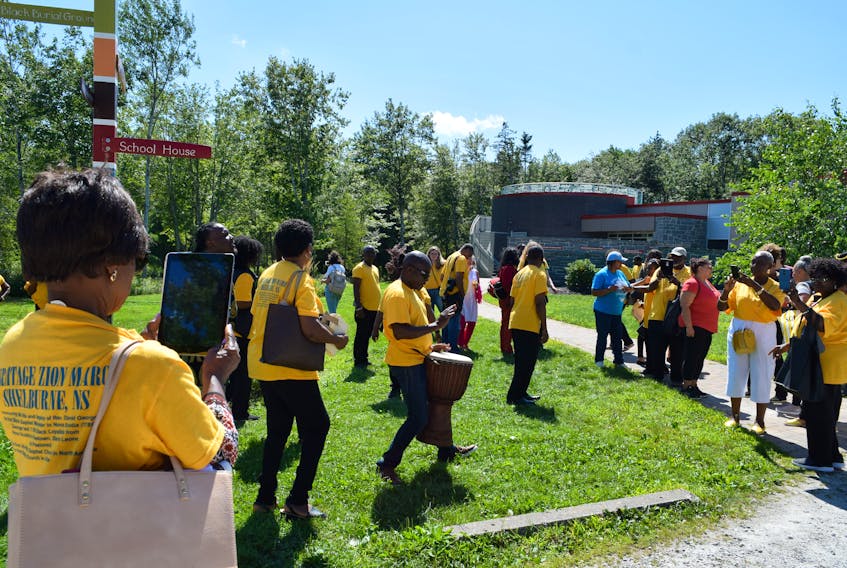BIRCHTOWN, N.S. — History was made in Birchtown on Aug. 30 when Black Loyalist descendants from Sierra Leone joined with their Nova Scotia counterparts to remember, honour and celebrate their ancestors and the incredible journey that is their legacy.
Organized by the Creole Heritage Association Canada, the welcome Zion March was part of the five-day event, Celebrating Creoledom: Our History, Our Culture, Our Heritage, that was held in Nova Scotia between Aug. 30 and Sept. 2.
Special tribute was paid to Rev. David George, a Black Loyalist spiritual leader who made the exodus to Sierra Leone from Birchtown in 1792 with his family, going on to establish the Zion Church in Freetown which it is one of the legacies of the Nova Scotian settlers.
“You have journeyed back to Birchtown to honour your ancestors and reflect on where you came from and how they survived,” said Chuck Smith president of the Black Loyalist Heritage Society.
“What courage and determination the Black Loyalists must have had to travel to Sierra Leone after escaping from slavery, travelling to Birchtown then taking another journey to Sierra Leone,” said Smith.
A descendant of Black Loyalists in Annapolis Royal, Smith said he often wonders if his ancestors made the decision not to go to Sierra Leone.
“That must have been a difficult decision,” he said. “Others were going and they decided to stay.”
Smith said it’s an “amazing story that needs to be told and needs to be told for years to come.
"I want my children and my grandchildren to tell the story," he said. "When I was young, I didn’t know where I came from. I didn’t know my story. When I found out it made me very proud to know how strong and resilient my ancestors were. I want the world to know the story of the Black Loyalists.”
Historically, Nova Scotia is known as the birthplace of the Creoles of Sierra Leone. Halifax was the departure point for the groups of liberated slaves and Black Loyalists who sailed to Sierra Leone in January 1792. The new arrivals were known as the Nova Scotian Settlers. In all, 15 ships carrying about 1,196 passengers left Halifax. They arrived in March on the shores of the West African colony owned by a British philanthropic organization called the Sierra Leone Company. They re-founded a destroyed settlement, which was given the name Freetown.
Eighty years later, they were joined by the Maroons, who originated from Jamaica but had previously tried unsuccessfully to settle in Nova Scotia. The Nova Scotia Settlers built houses, established churches, started families and founded the City of Freetown.
“We are making history here today,” said Yvette Stephens, Creole Heritage Association Canada. “We hope to have continued links with Black Loyalists here in Canada because we are related and we have to foster that relationship.”
A tree planting ceremony, prayers and songs including the Year of Jubilee, written by a former slave ship captain and sung on Jan. 15, 1792, when the Black Loyalists left Halifax, was sung as an iconic and symbolic tribute to freedom during the ceremony on the grounds of the Black Loyalist Heritage Centre before the group toured the site and the museums.
“Today’s march is a wonderful way to remember the settlers of the area, to relive the connection between here and Sierra Leone and to celebrate the life of the late Reverend David George, who was a Black Loyalist, a Baptist Minister, a mentor and a visionary,” said Shelburne Municipal Warden Penny Smith. “Take a moment to look around. This great man would have preached on these grounds, giving hope and encouragement to those trying to survive in what we know would have been a very hostile and challenging environment. It is so wonderful to have this opportunity to celebrate his legacy which has been felt around the world, and especially here in Birchtown.”
In the four years ago since the Black Loyalist Heritage Centre opened and in the years since the annual Journey Back to Birchtown celebration has been held, more than 35,000 people have made the journey to Birchtown, said Smith.
“Some have come specifically to trace their ancestry, while others have visited to learn the true story of the Black Loyalists.”
The work of Birchtown resident Dr. Elizabeth Cromwell, a founding member of the Black Loyalist Heritage Society was also recognized by several speakers.
“For more than 20 years, Dr. Cromwell was tireless and determined to see her dream for this beautiful Centre become a reality. She did not allow anyone or anything to stop her from telling the story that is now being told to the world,” said Smith.
President of the Africville Genealogy Society, Irvine Carvery, called the work of Dr. Cromwell and the Black Loyalist Heritage Society absolutely amazing.
"This is our heritage; this is our history and its so wonderful to have our Loyalist family home from Sierra Leone.”
Chuck Smith thanked Dr. Cromwell and the founders of the Black Loyalist Society “for the commitment to discovering, interpreting, safeguarding and promoting the history of the Black Loyalists in North America and beyond."
"The Black Loyalist Heritage Society feels events like this will help us meet our mandate. We hope we can continue to build a strong relationship with the Creole Heritage Association in the future," said Smith.
RELATED









